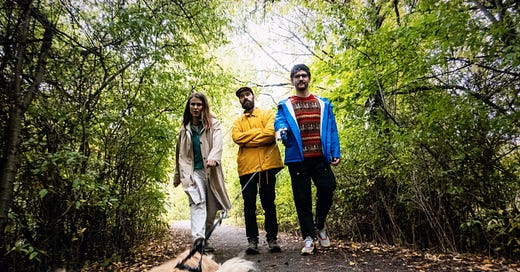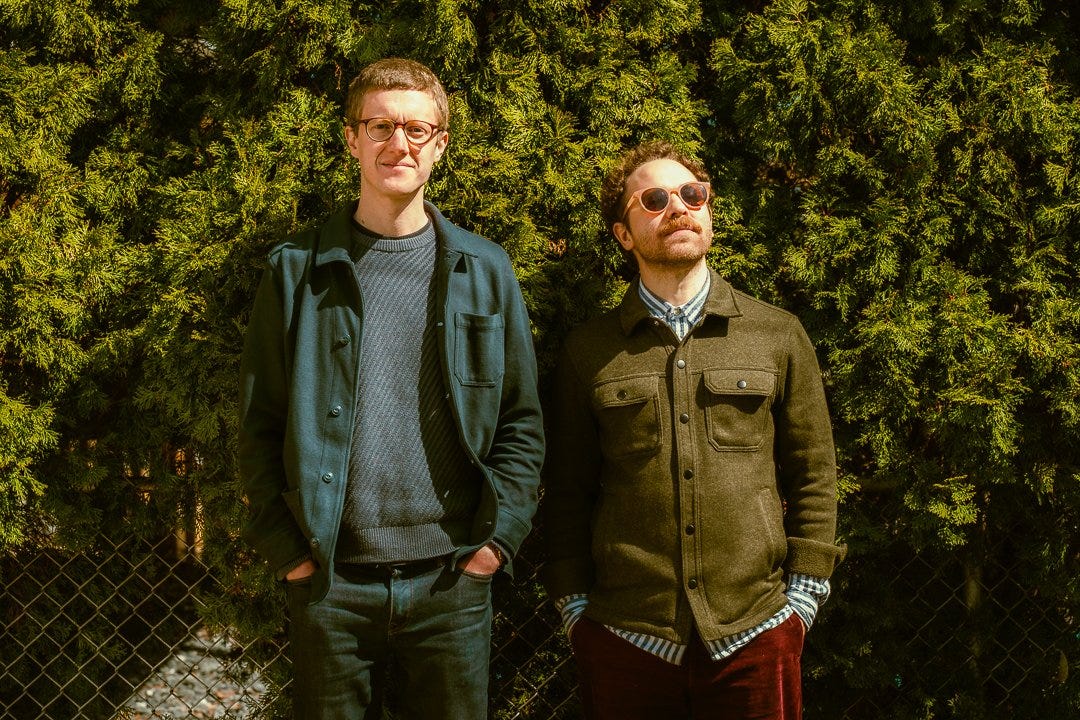I’m dipping back into action following a few weeks away from Nowhere Street, but Berlin is still in the final week or so of somnambulant summer. Next week things will suddenly toggle into overdrive, as you’ll soon see, but for now the action remains rather minimal. While there are some recommended concerts to check out below, I haven’t written previews for any of them. That will certainly change next week, too. In the meantime, some thoughts on a few recent recordings.
Finn Loxbo Lets it Rip in Kyosaku
Although I first heard the Swedish guitarist Finn Loxbo as a member of the ferocious trio Dog Life, with saxophonist Anna Högberg and drummer Mårten Magnefors, in recent years I’ve been drawn to his work at the opposite end of the sonic spectrum with his quartet Kommun. It’s a minimalist chamber ensemble with pianist Lisa Ullén, drummer Ryan Packard, and double bassist Vilhelm Bromander where Loxbo’s acoustic guitar oversees an incredibly ornate, post-Morton Feldman construction of lapidary detail, exquisite repose, and microscopic variation. The Stockholm quartet’s superb debut Ephemeralds was released on John Chantler’s Fönstret label last year, but the performances I’ve seen since then featured a much expanded iteration of the concert-length work, giving the musicians greater space to breathe and extrapolate upon the work’s core precepts.
Still, despite knowing that Loxbo has played with extreme volume and violence in older projects, I was knocked on my ass the first time I heard his playing in the trio Kyosaku, which made its recorded debut in January with a live set at London’s Café Oto released by the digital arm of the venue’s Otoroku! Imprint. The group, which also includes Packard on drums and Elsa Bergman on electric bass, pursues a furious strain of maximalism that seems to extend from Japanese guitarist Masayuki Takayanagi’s notion of Mass Projection, producing a dense, relentless wall of intense noise that overwhelms the senses. As Packard has written of the trio’s raison d’etre:
“Relentless as a conceptual place to live within. To be wide awake, relentlessly. To use a full peripheral vision and accept the full spectrum of color. To saturate. To stay within and grow deeper into the details of density, of a shared cohesive spirit. Endless variations under a common cause of stasis."
The Otoroku! recording features a single 37-minute work of febrile aggression that’s as exhilarating as it is punishing, but a more recent studio recording released by Corbett vs. Dempsey offers greater sonic detail and heft. Straight out of the gate Kyosaku lays out an attack of sheer punk rage, with Bergman’s needling bass and Packard’s high velocity snare stutter conveying the energy of an early Black Flag track; while the rhythm is pure piledrive, there’s nevertheless a kind of jacked-up swing behind the propulsion that’s far more peripatetic and agile than the expected 4/4 grind. This writhing foundation is perfect for Loxbo’s feedback-driven caterwauling, a canvas-filling splatter of acid-fried grime. The trio’s methodology involves launching a performance at full strength and never easing off of the pedal. In fact, the goal is to somehow summon even greater force as the performance unfolds. I can’t say if the volume level actually increases over time, but the shape and complexion of each part shifts subtly, whether it’s Packard reconfiguring his primal beats, Bergman altering her seething line, or Loxbo strangling a different string on his guitar, alternating between sustained blasts or vibrato-rich screams. Parsing how the trio progresses and rejiggers its materials seems kind of silly in the end, but those machinations are what make surrendering to the onslaught worthwhile. The music grabs the listener by the throat and never releases its grip, but it does adjust and move the vice-like authority around. It seems clear that this music is best experienced live, but until I get that opportunity this album has served up a heady mental cleanse. Below you can check out the opening track, “Ålagille.”
Chicago’s Black Diamond Transplant Cool Jazz Verities in the Midwest
Black Diamond, the project of reedists Artie Black and Hunter Diamond, has always stood apart from the improvised music scene in Chicago while being firmly part of it. There’s an airiness to its music and deep sense of space that feels different from the tough physicality and bluesy weight of so much of the city’s improvised music community. The group toggles between being a reed duo and a quartet, featuring bassist Matt Ulery and drummer Neil Hemphill, and both iterations are present on its recently released fourth album Furniture of the Mind/The Mind Rearranging, its debut for the We Jazz label. The reedists have pretty broad interests, but in this project they frequently evoke the deceptive ease of cool jazz. Both musicians retain a measured calm even when the rhythm section heats up, and they often engage in the beguiling contrapuntal improv that quietly made the west coast sound more substantive than its chill timbre suggested.
Both musicians write and the tunes they’ve crafted match the quiet invention of their multi-linear solos. As you can hear below, a ballad like Black’s “Seen,” it’s not about protean improv. Across four tender minutes the rhythm section moves at a sensual, sensitive crawl while two tenor saxophones gently embroider the contemplative melody, moving in and out of unison with gorgeous shading and delicate variation; neither reedist is soloing, per se, but they are clearly adjusting and responding in real-time in a way that’s no less satisfying than a lengthy statement based on the changes. A similar tack is taken on the following piece, Diamond’s “Zoetic”—although it takes almost two minutes for the rhythm section to enter the fold—and the horns eventually inject some extra space and distance from one another, letting one or the other to lead or establish a new wrinkle before the other joins in. This sort of playing is what initially fed my ardor for cool jazz, requiring both musicians to not only improvise on the tune, but to maintain keen awareness of what his partner is doing; staying out of the way, but also building new constellations of harmony and counterpoint at the same time.
This approach often puts the spotlight on the agile rhythm section, which both holds down the groove while adding accents and textures, like the striated arco tones Ulery floats into Diamond’s “Mantis.” Hemphill is in lock-step all across Black’s “Say to Yourself,” dropping foreful bombs when the quartet articulates the tightly arranged theme, but crafting deceptively complex parts as the mid-tempo gem chugs along, swinging with graceful precision. They hold the music aloft as much as they drive it. As with all of the band’s worthwhile output, the music transmits its charm and depth quietly. It doesn’t exactly force you to abide by its terms, but its veneer is so attractive and well-proportioned that the initial appeal will likely pull the listener in to discover all of the details hiding in plain sight beneath the gauzy surface. The final two tracks on the album—all of side D on the vinyl—feature just the reedists, who embrace a slightly different methodology. The stunning “Mycelium” is built around an intimate dialogue where the unison parts feel more like connective tissue than an outline. Instead, Black and Diamond produce a kind of improvised minimalism fueled by fleet yet easygoing interactivity. Their lines put me in the mind of a lot of the tuning-based music I hear in Berlin, although the duo is still operating from jazz tradition, as if Lee Konitz and Warne Marsh decided to improvise on a Feldman theme. As with the quartet material, the more one digs in, the richer the experience becomes.
Recommended Shows in Berlin This Week:
August 20: Fluxus Cardboards as part of Holy Fluxus. From the Francesco Conz Collection, Agnese Toniutti, prepared piano (Mieko Shiomi, Dick Higgins, Philip Corner, Giancarlo Cardini, A. Toniutti), 7 PM, St. Matthäus-Kirche, Matthäikirchplatz 1, 10785 Berlin
August 21: Hailu Mergia, 8:15 PM, Gretchen, Obentrautstr. 19-21, 10963 Berlin
August 21: Han-earl Park, guitar; Simon Rose, baritone saxophone, Jan Roder, double bass, and Willi Kellers, drums, 8:30 PM, Kuhlspot Social Club, Lehderstrasse 74-79, 13086 Berlin
August 23: Silke Eberhard, alto saxophone; Fink Floyd (Johannes Fink, cello, Rieko Okuda, piano, Antti Virtaranta, double bass, Greg Smith, drums), 8:30 PM, Kuhlspot Social Club, Lehderstrasse 74-79, 13086 Berlin
August 23: Müller & Mahall Moden (Florian Müller, guitar, Rudi Mahall, clarinets, Benjamin Lehmann, double bass, and Uli Jenneßen, drums), 9 PM, Kunstfabrik Schlot, Invalidenstraße 117, 10115 Berlin
August 24: Kuhn Fu (Christian Achim Kühn, guitar, Frank Gratkowski, alto saxophone, clarinet, flute, Tobias Delius, tenor saxophone, clarinet, John Dikeman, tenor saxophone, Sofia Salvo, baritone saxophone, Esat Ekincioglu, bass, George Hadow, drums); Frank Gratkowski’s Entrainment (Frank Gratkowski, alto saxophone, clarinet, flute, Kazu Uchihashi, guitar, Dan Peter Sundland, bass guitar, Steve Heather, drums), 3 PM, Jazz am Kaisersteg, Hasselwerderstr. 22a, 12439 Berlin
August 24: Harmonic Space Orchestra: Prime Time #5 (play Michiko Ogawa, Fragment One; Weston Olencki, It Began to Rain and So Did I; Sam Dunscombe, Fifth Study in Mass Plasma Synthesis; Rebecca Lane, new work; M.O. Abbott, Birefringence; Ellen Arkbro, Nightclouds), 8:30 PM, KM28, Karl Marx Straße 28, 12043 Berlin






Thanks for the reviews. Listening now. Do you (or anyone else) know why Frank Rosaly's presence seems to have disappeared from Bandcamp?